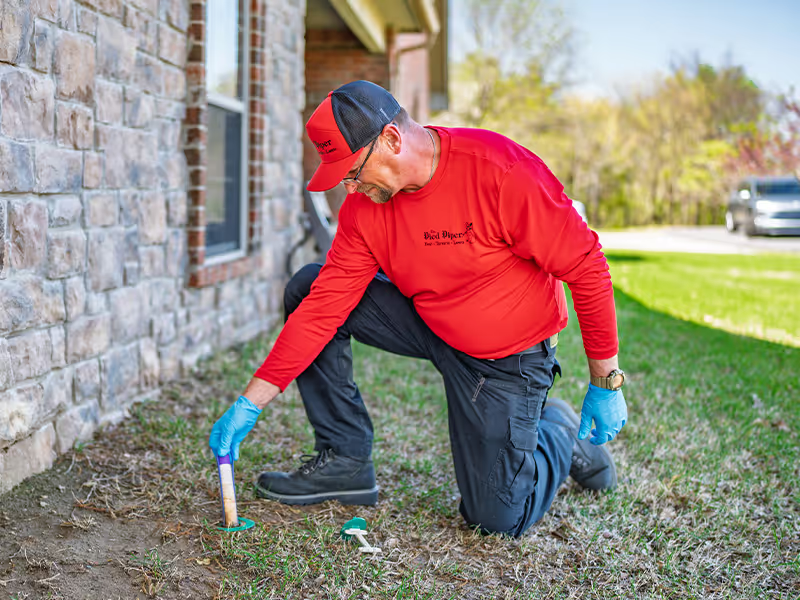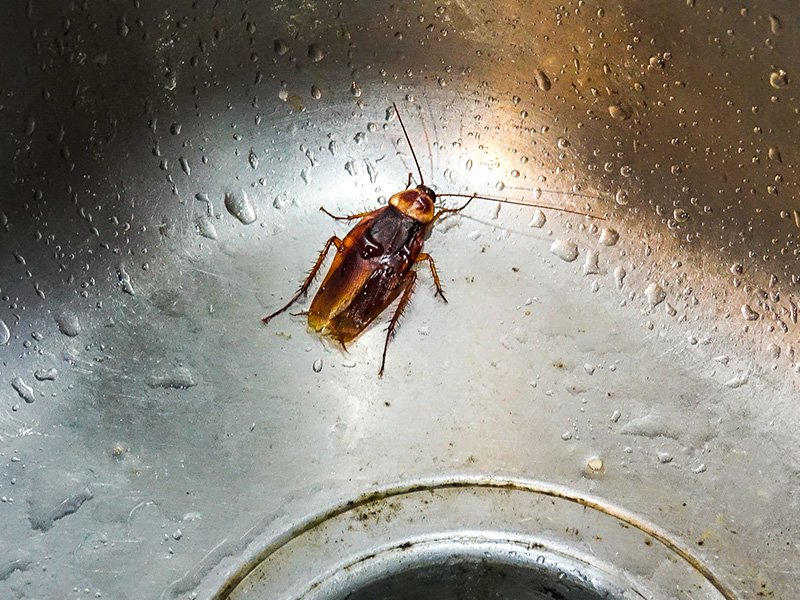The Most Common Ants in Dallas/Fort Worth
Odorous House Ants
- Odorous house ants are small, dark ants known for their rotten, sweet smell when crushed
- Commonly found in kitchens, attracted to spilled juice, fruit, and other sweet foods
- Build soil nests outdoors under mulch, stones, or bricks, but will move inside near leaky pipes
- While not dangerous, they contaminate food and are very persistent once inside
Acrobat Ants
- Medium-sized ants that lift their abdomen like an acrobat when threatened
- Often nest in wood, insulation, or high-moisture areas
- Acrobat ants can sting, though the pain is mild compared to fire ants
- Forage far from their nest, meaning they’re often spotted in kitchens searching for food
Crazy Ants
- Named for their fast, erratic movements
- Build large nests in damp soil, compost piles, or under rocks
- Invasive species that form huge colonies, often outcompeting native ants
- Feed on insects, plants, and sweets — basically anything edible they can find
- Hard to control due to their colony size and adaptability
Carpenter Ants
- Among the largest ants in Texas
- Carpenter ants create smooth tunnels inside wood, causing structural damage
- Colonies contain tens of thousands of ants, with constant expansion
- Prefer damp wood and may move into walls, ceilings, or attics of Texas homes
- Can deliver a painful bite if disturbed
Fire Ants
- Fire ants are one of the most aggressive ant species in Texas
- Deliver painful stings that cause itchy welts and can trigger allergic reactions
- Build large soil nests shaped like mounds, often near home foundations or in open yards
- Swarm aggressively when disturbed, making DIY removal dangerous
- Require professional treatment to eliminate the entire colony
Harvester Ants
- Medium-to-large ants commonly found across Texas
- Build large soil nests with bare, circular areas around the mound
- Harvester ants forage outdoors and are known for collecting seeds, but may wander near homes
- Possess a sting that can be painful, though they are not usually aggressive unless their nest is disturbed
- Often spotted in open, sunny yards, they can damage turf by stripping vegetation around their nests
Pharaoh Ants
- Tiny ants that thrive indoors, especially in warm environments
- Common in kitchens, hospitals, and other buildings with steady food sources
- Nest in hidden areas such as wall outlets, under carpets, and inside appliances
- Difficult to eliminate because colonies often split into multiple nests when threatened
Rover Ants
- Extremely small ants that can slip through cracks in foundations
- Build soil nests outside, but frequently move indoors during hot weather
- Often found in kitchens and bathrooms
- Not harmful, but frustrating due to the sheer number of ants in a colony
Why Ants Are Such a Problem for Texas Homes
Ants are everywhere in DFW — from suburban neighborhoods to rural yards. Here’s why they’re more than just a minor annoyance:
- They live in large colonies. A few ants in your kitchen usually mean thousands more are nearby. These social insects rely on teamwork, which makes infestations spread fast.
- Some species build soil nests outdoors, while others establish hidden nests indoors. You may not even know where the problem comes from until it’s severe.
- They contaminate food. Kitchens are among the most common targets because ants like sweet foods and grease.
- Some cause damage. Carpenter ants tunnel through wood, and fire ants weaken lawns with their mounds.
- They bite and sting. Some species, like fire ants, defend their colony aggressively and can cause painful stings.
Because ants are so adaptable, protecting your Texas home takes more than just spraying the ones you see.
Where Ants Build Their Nests in DFW
Ants are experts at finding safe, hidden places to build their colonies. In Dallas/Fort Worth, nests are most often found in:
- Soil nests in lawns, gardens, and landscaped areas
- Large nests inside wood, especially in damp walls, ceilings, and tree trunks
- Kitchens and bathrooms, where food and water are easy to find
- Foundations and wall voids, which give shelter and protection
- Outdoors under mulch, rocks, or leaf litter
Knowing where ants live helps you understand why they keep returning, even after you think you’ve gotten rid of them.
How to Prevent Ant Infestations in Your Texas Home
While professional treatment is the best way to stop an infestation completely, here are some steps homeowners can take to make their homes less inviting to ants:
- Seal entry points around foundations. Ants can squeeze through the tiniest cracks, so seal gaps around windows, doors, and utility lines.
- Keep your kitchen spotless. Wipe counters, sweep floors, and store sweet foods in airtight containers. Even tiny crumbs can feed an entire colony.
- Fix leaks and reduce moisture. Many species rely on water to survive, so repairing dripping faucets and leaky pipes goes a long way.
- Reduce clutter outside. Remove leaf litter, excess mulch, and piles of wood that can shelter soil nests.
- Monitor for early signs of nests. Large nests around your yard or near foundations should be dealt with quickly before they expand.
FAQs About Ants in DFW
Do ants damage Texas homes?
Yes. While nuisance ants mostly contaminate food, carpenter ants can damage wood, and fire ants can weaken lawns with their soil nests.
Why do ants invade kitchens?
Kitchens provide easy access to sweet foods, grease, and water, everything an entire colony needs to survive.
Are fire ants dangerous?
Fire ants are aggressive. Their painful stings can cause allergic reactions in some people, so it’s best to avoid disturbing their nests.
Can I get rid of an ant colony myself?
DIY sprays may kill a few ants, but rarely eliminate the entire colony. Professional ant control targets nests directly to stop the problem at its source.
Professional Ant Control in Dallas/Fort Worth
Ants may be small, but their colonies are built for survival. Whether you’re dealing with nuisance ants in your kitchen, carpenter ants in your walls, or fire ants near your foundation, Pied Piper Services has the expertise to remove them.
We understand that no two infestations are exactly the same; that’s why we offer customized treatment plans for Texas homes. Our goal is to eliminate the entire colony, not just the ants you see, and keep them from coming back.
Ready to protect your home from ants? Contact Pied Piper Services today for expert ant control in Dallas, Fort Worth, and surrounding areas.





















